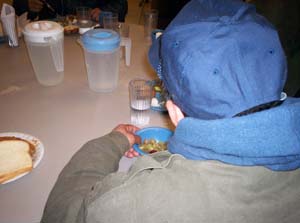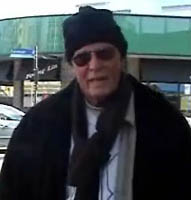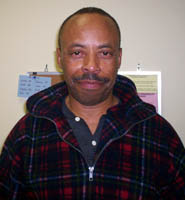 |
|
|
Politics
Main Page |
|
Homeless Spend Days Doing What They 'Have to Do'
Maryland Newsline Thursday, Dec. 13, 2007 SILVER SPRING, Md. - The path to homelessness is different for everyone. But once they’re on the streets, the daily lives of many homeless people are similar. They sleep where they can—preferably indoors at a shelter, especially when it’s cold—and learn which charities offer food and clothing when and what the rules are for each. They navigate a maze of transportation schedules and government assistance programs. For a lot of them, the homelessness is a symptom of a more fundamental problem, such as mental illness or addiction, said Susan Kirk, executive director of the nonprofit Bethesda Cares. The problem may have led the person to problems with a network of family and friends whom they might have been able to turn to for help. Or, Kirk said, it might have kept them from establishing a network of loved ones. “There’s something that’s happened, either they don’t have a support system, or they’ve broken the trust with the family,” Kirk said. “I do see an awful lot of these guys were abused as children, either physically or sexually … so that would kill the core trust right there.” Yet for some people, homelessness is what happens when they’ve “run out of luck,” said Jacki Coyle, executive director of Shepherd’s Table, a nonprofit in Silver Spring that provides meals, showers and other services to the homeless. A “misconception people have is that folks [who] are homeless are not like you and I,” Coyle said. “Well, you know what, they’re just like you and I. They’re wonderful people who just are without a home.” They’re people like Ernest Johnson, who said he can’t find an affordable place to live on his own. Johnson, who spends several days a week at Shepherd’s Table, said he resents it that some people buy into stereotypes and think, for example, that all homeless people are drug addicts. He said he has met doctors, lawyers and others with a college education who were in the same situation as him. “(People) just don’t know … what that individual went through, how they became homeless,” said Johnson, 60. “They miss the whole point. Because somehow, they could be here.” They're people like Mike Casey, 54, who has become so accustomed to living on the streets that it feels normal. "It's fine," said Casey, who regularly visits Bethesda Cares. "I do what I have to do." When homeless people—no matter their back stories—come to Bethesda Cares, Kirk said the staff sometimes finds there’s more to the story than their clients initially tell them. Clients may be unwilling to talk about abuse or other issues, or they may be afraid to step into a new phase of their lives. Maryland Newsline talked to Johnson and Casey about their stories -- how they became homeless and what daily life is like for them. Both freely shared their stories. But neither would provide Newsline with contact information for family or friends. Mike Casey
Casey's father was the person who helped him keep his life together. In 1997, Casey said he was working as a fiber optics contractor when he hurt his already bad back. After tripping up some stairs while carrying something heavy, Casey needed surgery for the third time in 10 years, he said. The operation cost him his money, his health insurance and his ability to work, he said. Not long after, Casey moved into his father’s house in Olney, Md. “We took care of each other,” he said. Then, Casey’s father died. By early 2004, the house had been repossessed and auctioned off. Casey, who said he once earned an $87,000 salary, was homeless. Almost four years later, he’s still on the streets, mostly in Bethesda. Casey won’t say where he sleeps, only that it’s near a grate, so he has heat. “I got a place right now that I don’t tell nobody about it, because they’ll come find it and take it from me,” he said. In the morning, he usually cleans himself up in the bathroom of a supermarket. All day long, he pulls his belongings—including a green duffel bag, a black backpack, a red coat and a child-size sleeping bag someone gave him— behind him on a black cart. He bought it last month at Wal-Mart for $17.56. Where does he get the money for such expenses? Sometimes, he said, a business owner will pay Casey to do “sign walking” -- walking around wearing a sandwich board with advertising. But those jobs are few. “I don’t like to say it,” Casey said slowly. “I panhandle.” On Woodmont Avenue, where Casey spends a lot of his time, people have given him food, including steaks from Houston’s Restaurant. They’ve also given him blankets, like a thin, baby blue one with cartoon characters on it, which Casey said he’s embarrassed to sleep with, and clothes, like the white T-shirt Casey wore inside out to hide a stain. Most of the clothes Casey wears are “throwaways,” because he rarely has a place to wash his clothes. He’d never throw away some things, though, like a thick brown scarf he found at a resource center for homeless people. “It’s beautiful,” he said, looking down at it hanging around his neck and rubbing it with his hands. “It’s acrylic.” Some people give Casey money. When he gets $6, he said he likes to go to the Montgomery Aquatic Center for a shower. Once he pays, he can stay all day and even use the sauna. Casey takes at least three showers a week in the winter and at least five showers a week in the summer, he said. He takes more if he’s meeting with friends for a meal or to use some free movie passes someone has given him. For business, Casey goes to the office of nonprofit Bethesda Cares, where he gets his mail, or to the public library. He reads and uses the computer, sometimes to try to find housing through a nonprofit. About a year ago, Casey found transitional housing, at least for a while. But a couple months after moving in, Casey moved out. He said it was because of “problems in the house,” including a roommate who was breaking house rules. “A lot of things went wrong there,” he said. So, Casey remains homeless. He continues to rely on charitable organizations for many of his meals. As he left a Bethesda Cares lunch that included soup, cookies and fruit cups this week, Casey accidentally dropped the handle on his cart. It fell on the ground, but his belongings, which were strapped on, stayed in place. “It happens all the time,” Casey said. “It’s fine.” He picked up the cart and began walking down Wilson Lane, near the church where the meal was served. Casey has come to feel somewhat at home, even territorial, on Woodmont Avenue. In the last three years, he said, he’s had at least three people living on the street taken away by the cops for causing trouble. Continuing down Wilson Lane, Casey said he knows most of the municipal workers in the area. He called out to a man writing traffic tickets for cars parked by expired meters. “Don’t send that to my home now,” Casey joked. The man writing tickets ignored him. Ernest Johnson
Five years ago, when he was 55, Ernest Johnson retired from his job as a pressman at Huff Printing and Ad Specialties in Washington, he said. Babe Heller, the buyer for the business, said Johnson was “an excellent pressman” and is “a great person.” After retiring, Johnson moved into a room in his hometown of Silver Spring. But Johnson said it came with too many rules, including one that banned overnight visitors. He thought he could do better and moved out. Johnson said he couldn’t find another place he could afford, so he ended up on the street, depending on places like Shepherd’s Table for meals, clothing and shelter at night. There was about a year, he said, where he shared an apartment with a roommate; but the roommate had an even harder time than Johnson coming up with his part of the $800 a month needed for rent. So, when it’s warm outside, Johnson tries to find work during the day. When people come by Shepherd’s Table looking for day-laborers, Johnson is one of the first to volunteer. “I’ve been retired,” he said. “I’ve been getting restless.” On Wednesdays, he helps the executive director at Shepherd’s Table with her work. Every other day he’s there, Johnson makes it his job to see that people are taking their turns to wash clothes and shower correctly. He also looks for part-time work. At night, Johnson sleeps at Shepherd’s Table or another shelter, depending on the time of year. Shepherd’s Table, located in a building owned by Montgomery County in downtown Silver Spring, is only an overnight shelter during the coldest months. Then, employees and volunteers clean up the dining room after the nightly 6 p.m. to 7:30 p.m. dinner and lay out mats for men who need somewhere to stay. Women can sleep on the other side of the building, which is used by Community Vision, a program of the nonprofit Community Ministry of Montgomery County. Whether he’s at Shepherd’s Table or elsewhere, Johnson carries his pay-as-you-go cell phone on his hip. His adult children, a man and a woman who live in North Carolina, often call him, he said. They also visit. Lately, they’ve been coming to see him about three times a month, Johnson said. They meet to see movies, eat at restaurants or go to the home of one of Johnson’s two brothers who live in the area. Can’t Johnson stay with one of his brothers when his children aren’t visiting? Sure, he said, but it would be inconvenient. Johnson would need to get up when his relatives do. And, he said, finding public transportation in Oxon Hill and Southeast Washington, where his brothers live, would be more difficult than at Shepherd’s Table, a few blocks from the Silver Spring Metro station. Raechal Leone can be reached at raechal.leone@gmail.com. Copyright © 2007 University of Maryland Philip Merrill College of Journalism Banner graphic by Hortense Barber and Diego Mantilla. Banner photos of homeless person's cart and homeless man sitting are courtesy of Greg Sileo.
|



